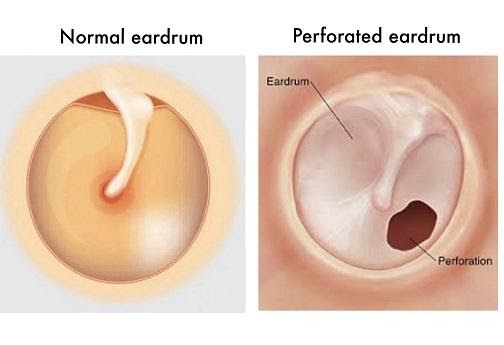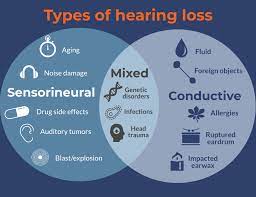Blog
A Guide to Ruptured Eardrum Hearing Loss : From Diagnosis to Recovery
Ruptured Eardrum Hearing Loss: Causes, Symptoms, and Treatments
The eardrum, also known as the tympanic membrane, is a thin, delicate layer of tissue that separates the outer ear from the middle ear. When this membrane is damaged or torn, it can lead to a condition called a ruptured eardrum, which can result in temporary or permanent hearing loss. In this blog, we’ll discuss the causes, symptoms, and treatments of ruptured eardrum hearing loss.

Causes of Ruptured Eardrum Hearing Loss
A ruptured eardrum can occur due to a variety of factors, including:
- Physical Trauma: Blunt force trauma, such as a blow to the ear or head, can cause the eardrum to rupture.
- Infection: Infections of the middle ear, such as otitis media, can cause pressure to build up and rupture the eardrum.
- Loud Noises: Exposure to loud noises, such as those from heavy machinery or concerts, can cause the eardrum to rupture.
- Insertion of Foreign Objects: Inserting objects into the ear, such as cotton swabs or hairpins, can damage the eardrum and lead to a rupture.
- Barotrauma: Rapid changes in air pressure, such as those experienced during scuba diving or air travel, can cause the eardrum to rupture.
Symptoms of Ruptured Eardrum Hearing Loss
The symptoms of a ruptured eardrum can vary depending on the severity of the rupture. Common symptoms include:
- Ear Pain: Pain in the ear is a common symptom of a ruptured eardrum, especially if the rupture was caused by physical trauma or an infection.
- Hearing Loss: A ruptured eardrum can result in temporary or permanent hearing loss, depending on the extent of the damage.
- Tinnitus: Tinnitus, or ringing in the ears, can occur as a result of a ruptured eardrum.
- Drainage from the Ear: If the rupture is accompanied by an infection, fluid may drain from the ear.
- Vertigo: Vertigo, a feeling of dizziness or spinning, may occur as a result of a ruptured eardrum.
Read Also : Can a job fire you for going to rehab
Treatments for Ruptured Eardrum Hearing Loss
The treatment for a ruptured eardrum will depend on the cause and severity of the rupture. In many cases, the eardrum will heal on its own within a few weeks. However eardrum berfungsi untuk, if the rupture is severe or if there is an infection present, medical treatment may be necessary. Here are some common treatments for ruptured eardrum hearing loss:
- Medications: Antibiotics may be prescribed if an infection is present, and pain medication may be recommended to relieve ear pain and ear safety.
- Surgical Intervention: In some cases, surgery may be necessary to repair a ruptured eardrum. This may involve a procedure known as a myringoplasty or tympanoplasty, in which a graft of tissue is used to repair the eardrum.
- Hearing Aids: If hearing loss is permanent as a result of the rupture, hearing aids may be recommended to help improve hearing and prognosis hearing loss.
- Earplugs: Earplugs can help protect the ears from loud noises, which can prevent future ruptures.


Preventing Ruptured Eardrum Hearing Loss
There are several steps you can take to reduce your risk of developing a ruptured eardrum. These include:
- Avoiding loud noises: Wear earplugs or other protective devices when exposed to loud noises, such as concerts, fireworks, or heavy machinery.
- Avoid inserting foreign objects into the ear: Never insert objects such as cotton swabs, hairpins, or pencils into the ear. These can cause damage to the eardrum and increase the risk of infection and eardrum adalah.
- Treating ear infections promptly: If you suspect that you have an ear infection, seek medical attention as soon as possible. Prompt treatment can help prevent the infection from becoming severe and causing a ruptured eardrum.
- Avoiding changes in air pressure: Be cautious when scuba diving, flying, or traveling to high altitudes. Try to equalize the pressure in your ears by yawning or swallowing frequently.
- Seeking medical attention for ear injuries: If you experience a blow to the head or ear, seek medical attention immediately. Prompt treatment can help prevent a ruptured eardrum and other complications.
How long to Heal Ruptured Eardrum Loss
The healing time for a ruptured eardrum can vary depending on the severity of the rupture and the individual’s overall health. In general, small ruptures may heal on their own within a few weeks, while larger ruptures may take several months to heal completely.
Conclusion
A ruptured eardrum can be a painful and concerning condition that can result in temporary or permanent hearing loss. However, with prompt medical attention and proper treatment, most ruptured eardrums will heal within a few weeks. By taking steps to protect your ears and seek medical attention promptly for any ear-related issues, you can reduce your risk of developing this condition and protect your hearing for years to come.
-



 Mod6 months ago
Mod6 months ago10 Komban Bus Skin Download – Livery HD Download
-



 Mod8 months ago
Mod8 months ago25 Bus Simulator Indonesia Livery – HD Download
-



 Mod8 months ago
Mod8 months ago10 Best Tamil Nadu Bus Livery – Mod HD Download
-



 Life Style2 years ago
Life Style2 years agoLove Failure Images – 1000 Love hate images for download
-



 Blog8 months ago
Blog8 months ago24 Girls WhatsApp Number for Chatting and Friendship
-



 Mod10 months ago
Mod10 months ago10 Tamil Nadu private bus livery download
-



 Entertainment1 year ago
Entertainment1 year agoAll Movies Hub 2023 Download Latest HD Movies, Web Series
-



 Entertainment9 months ago
Entertainment9 months agoScam 1992 Web Series Download Google Drive HD






